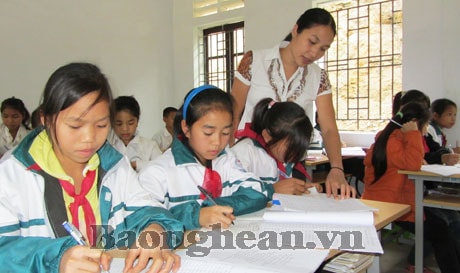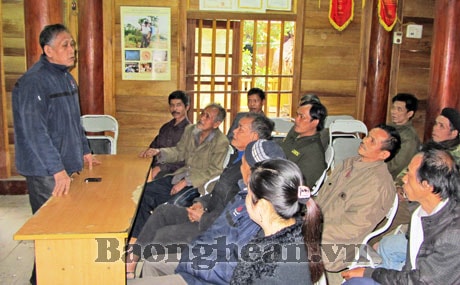Tuong Duong: The arduous task of preserving national cultural identity...
(Baonghean) -On the last day of the year, we returned to Tuong Duong, where efforts are being made to preserve and promote the cultural identity of ethnic groups. The head of the Vi Sat Son district Cultural Office said that the office is implementing a program to teach the Thai Lai Pao script. Which is the farthest place?
He replied: Nga My…
Nearly 70 km from Hoa Binh Town, Nga My Commune consists of 9 villages with an area of 18,584.39 hectares, 959 households, 4,397 people, of which 855 are poor households. With the attention of the district, Nga My is implementing a class to teach Thai Lai Pao at the secondary school and teach the O Du language in Vang Mon village.
The Thai Lai Pao class is taught by Ms. Luong Thi Ngoc, an officer of the 30a Program of Nga My commune. The atmosphere in the class is quite lively. A little shy, Vi Thi Nga, a student of class 8D, said that she can write letters, combine letters and spell. According to Nga, learning Thai Lai Pao is not too difficult. When asked if learning letters is as enjoyable as other subjects, Lo Tai Tri said: "I like it because this is the writing of my people. But I hope that all my friends can learn letters...".
Teacher Luong Thi Ngoc and students of Lai Pao Thai writing class.
According to Luong Thi Ngoc, the need for literacy among students in Nga My is very high, but she alone cannot handle it. The class she is teaching has 40 people, including students of all levels and several commune officials, which is beyond her capacity. Ngoc confided that because the students are conscious, teaching literacy is convenient, but there are also many difficulties. Due to the lack of a teaching location and having to borrow a classroom, literacy is taught mostly in the evening, while Ngoc is also busy with her young children. The Lai Pao literacy curriculum has 20 lessons, which do not fully demonstrate the unique features of Thai culture and make it difficult for students to reach the level of reading and writing fluency. Moreover, because the pronunciation of Thai people in each area in Tuong Duong is different, for example: the word "eating rice" is pronounced "ki khau" by Thai people in Nga My, Yen Hoa, while the Thai people in Luong Minh, Luu Kien, Tam Quang, Tam Thai pronounce it "kín khau", so when expressed in writing, there is no uniformity. According to Ngoc, funding for training is an issue that needs more attention. “I am not too concerned about my own compensation, because being able to teach my people is a source of happiness. However, there must be funding to train more teaching staff, open classes, compile more materials… so that more people can learn and learn Lai Pao well.”
Mr. Lo Van Nghe teaches the O Du language to the people of Vang Mon village.
Vang Mon village, Nga My commune is the place where the O Du ethnic group resides under the resettlement program of Ban Ve Hydropower Plant. Currently, the whole village has over 90 households with about 400 people. According to Party cell secretary Mac Thi Tim and village chief Lo Xuan Tinh, due to living scattered and mixed with other ethnic groups for many years, the language of the O Du ethnic group has been lost, so when they return to live together, the teaching of the language is being organized and implemented by the superiors. However, teaching the language is facing many difficulties because it depends on the 5 elderly people of the village, while they are all weak, their voices are not clear, so it is very difficult to convey to the learners. All 5 elders can only remember about 100 words, and there are no community cultural activities to use, when going out they use Kinh and Thai languages, so the teaching efficiency is low...
Contacting the elders Lo Van Nghe and Lo Hong Phong - the ones who pass on the language - we see that preserving the cultural identity of the O Du ethnic group is extremely difficult. They are passionate and try to use all their vocabulary to teach in the hope that their language will not be lost. Unfortunately, their strength is limited, while teaching requires many things that the elders and the O Du community in Vang Mon village cannot handle. When we left Vang Mon, Party cell secretary Mac Thi Tim said: "There are still many difficulties beyond the reach of the village. I hope that the superiors will find language teaching materials and supplement the budget, because for one teaching session, both the teacher and the student only get 30,000 VND...".
According to Head of the Department of Culture Vi Sat Son, after 4 years of implementation, the district has opened 12 classes to teach Thai Lai Pao in many communes with about 400 students. The budget for each class was 43 million VND in the past, but in 2012, 60 million VND was allocated for each class. “There are many expenses such as printing documents, teaching fees, management fees... but the funds are very slow to come in. In 2012, we had to borrow money to open a class. Until now, the source has not come in, the staff of the department is carrying the documents to the province to settle the accounts” - Mr. Son said - “Teaching is difficult, but getting students to maintain and use the written language is even more difficult. The Department of Culture wants to print some books of folk stories and folk songs of the Thai ethnic group in Lai Pao to send to the school library for students to use, but there is no funding so we have to give up. Moreover, cultural activities are too few, each year there is only one writing competition at the Van Temple - Cua Rao Festival. If you learn but do not use it, you will forget it after a short time…”.
Regarding the O Du people in Vang Mon, according to Mr. Son, the province has invested more than 2 billion VND and assigned the Ethnic Committee to implement the project "Supporting the development of the O Du people", which includes supporting production, building a system of cultural houses and opening language classes to restore the language for the people. However, the current implementation is not effective, because the language teachers are old, do not have pedagogical skills, teach orally, and do not have enough language, so it is very difficult for the people to absorb and communicate. The life of the O Du people is very hard and difficult, so few people still study...
Through discussions with officials of the Xiangyang Cultural Office and what was witnessed in Nga My, in addition to the efforts of the local government and the sense of pride of the people, there needs to be more support in all aspects for the work of preserving and promoting the cultural identity of the ethnic groups here to achieve results.
Nhat Lan






